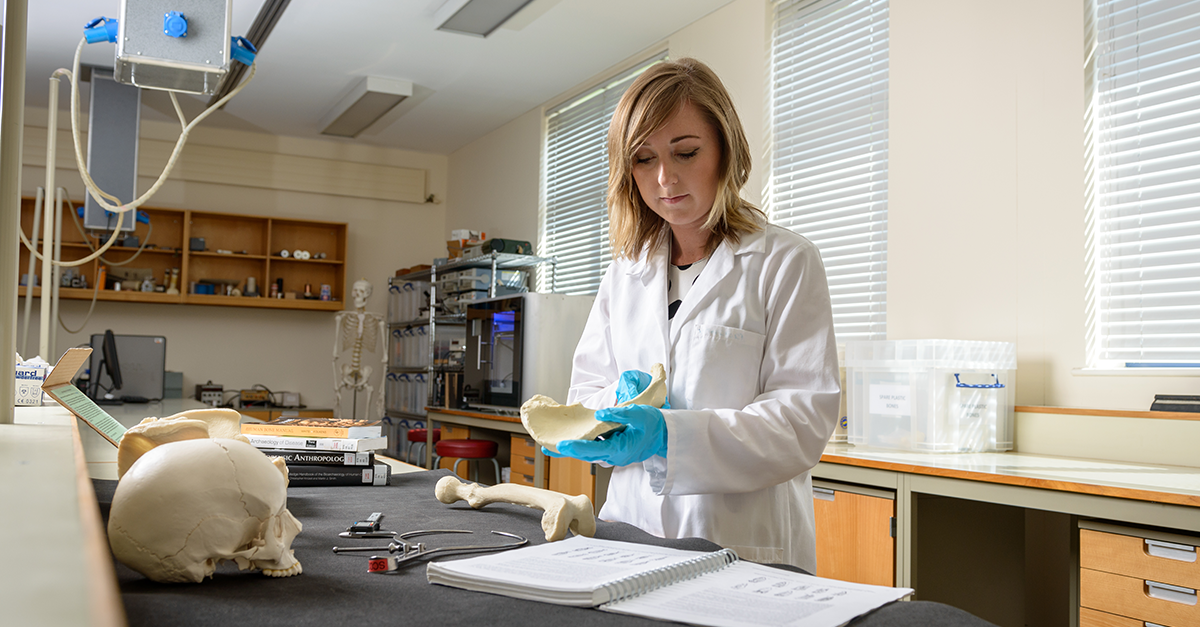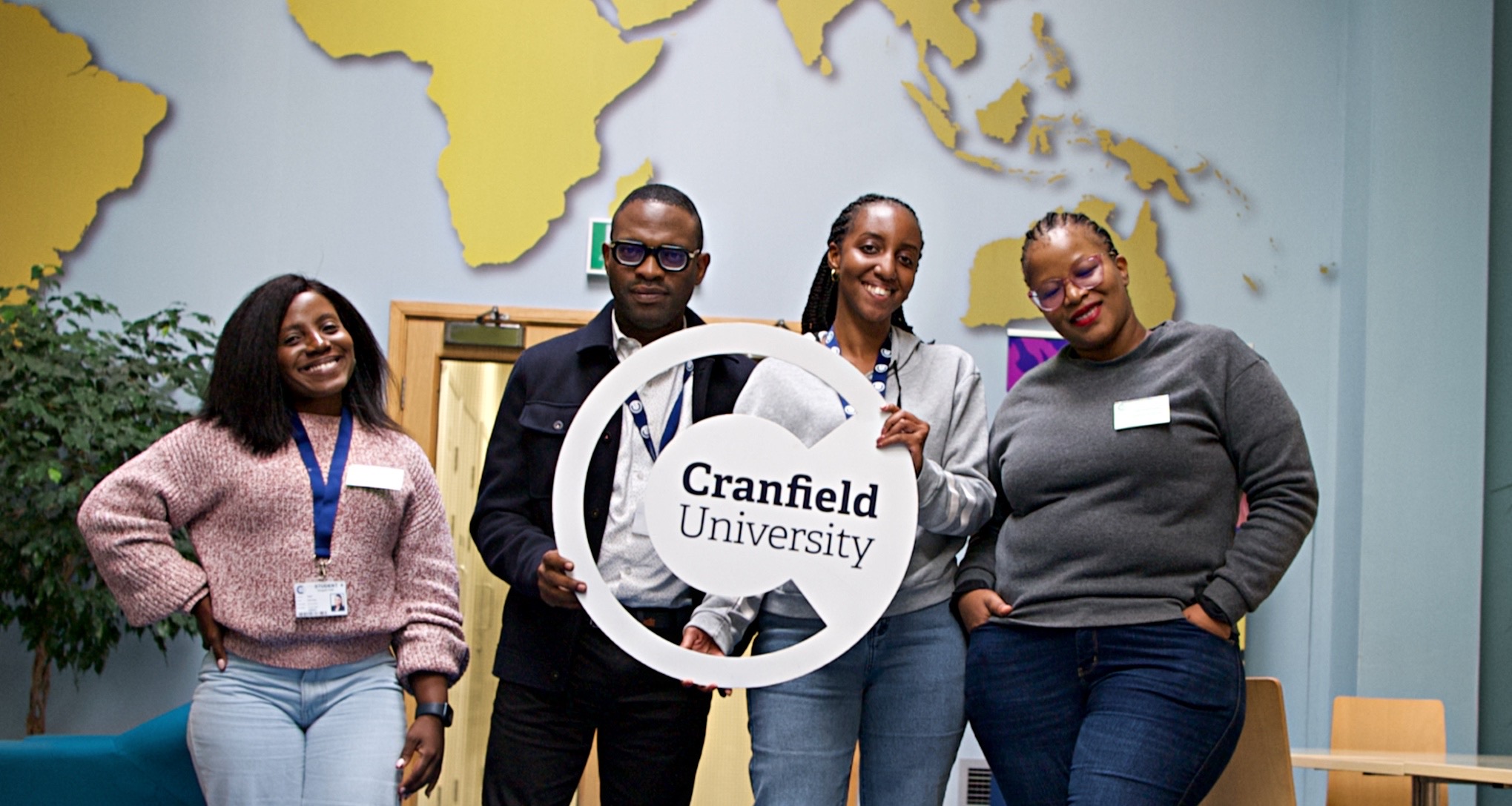Interview with Vice-Chancellor’s prize winner – Emma Saunders, Forensic Anthropology PhD
06/07/2016

Emma Saunders, Forensic Anthropology PhD, Cranfield University
Forensic Archaeology and Anthropology MSc, 2015
About you
What were you doing before you started your course at Cranfield?
I did an undergraduate degree in medical sciences and then I worked in the NHS for a year before starting my master’s. The medical sciences degree was a three year course used as an access to medicine for a lot of people. It was an introduction to the different sides of medicine and the medical sciences. It had strong elements of anatomy and drug resistance and things like that. My year as a health care assistant for the NHS was quite a close link to my medical sciences degree and I really enjoyed that.
What sparked your interest in Forensics and why did you choose this course at Cranfield?
In the third year of my undergraduate degree I did a module in anthropology and I absolutely loved it. We did a lot of work on biological profiling, which is a technique commonly used in forensic anthropology to help identify an individual. That sparked my interest and I knew that was the path I wanted to take rather than the medicine route. The forensics side came when I was actually looking at Cranfield – the modules were so appealing and unique that I decided this was definitely the path that I would like to take. I’m very interested in anthropology within a modern setting so it kind of grew out of that – my background isn’t in forensics but I did a lot of anatomy in my medical sciences course.
Can you tell me about any highlights of your course and time at Cranfield?
A lot of the modules are really interesting, and there’s quite a high practical element to the course. There’s an elective module to go and help on an archaeological excavation so that was really great to see it as it happens, and be directly involved. We went to Ogbourne St Andrew near Marlborough and we were looking for signs of settlement after a team did geophysics work on the ground to identify areas to excavate further. Shortly after I completed my master’s I assisted on CFI deployment with two of the lecturers to assist in some identification of WWI and WWII casualties with Roland Wessling and Dr Nicholas Marquez-Grant.
You have been awarded this prize for outstanding marks at CDS, and contribution to the course – can you tell me a little about that? And also what the Vice-Chancellor’s Prize means to you?
I really enjoy being at Cranfield and on the Shrivenham campus. It’s a fantastic environment to study and you can do a lot of other things as well while you’re here. In terms of contributions to the course, I attended a lot of the extra osteology sessions and I did charity fundraising for the student association. I tried to integrate myself as much as possible with the environment so I attended the Mess functions, which has obviously lead to my role as the Officer’s Mess Entertainments Representative – the position I hold now.
The anthropology department run additional osteology sessions, which is a great chance to get practical hands on experience. So when it comes to exams and future work, you’re confident in your ability as an anthropologist to do the techniques required in the field. It’s supervised by Dr Nicholas Marquez-Grant. I also did a bake sale to help raise money for the Nepal earthquake, to help rebuild communities and a local school.
The prize is fantastic, it means a lot to me professionally. It’s great to know that I’ve been recognised for my achievements and it will be good to include on my CV after my PhD. It’s just very exciting!
About your PhD
Please describe your key responsibilities and what you enjoy and find most challenging about your current study?
I started my PhD in February, so it’s relatively new. I’m really enjoying immersing myself in my subject in a lot more depth. I was surprised by how different the PhD is from the master’s. It’s a lot of self-directed learning and self-motivation, which I think could be quite challenging at times. But I enjoy working that way because you do get to go into as much depth as you like. The master’s thesis is a fantastic way to lead into doing self-directed learning and reading.
Currently I’m doing literature reviews, so I spend a lot of time researching and ensuring I understand the subject completely. It’s a lot of primary and secondary research, and meetings with people who have expertise and interest in the area. The library is fantastic – I’m always there.
What do you hope to do after your studies?
After my PhD I’m interested in continuing research in this area by entering a career in academia. I’m particularly interested in how pathological conditions affect the skeleton, and hope to continue into a career within this field. There’s a large area of physical anthropology that looks at diseases that affect the bone and I’m interested in what diseases are caused by lifestyle, particularly in the modern day and how they would impact on the bone.
Your relationship with Cranfield
You are Cranfield’s Mess Entertainments Officer – what does this involve?
I’m the Cranfield University entertainments representative on the Mess committee. I started at the end of October and I really enjoy it. It’s a great opportunity because it’s a military Mess therefore it’s a privilege for civilians to be involved. Currently I help organise events, for instance formal dinners, black-tie events for the military and civilians on this site as well as some informal events too. It’s also a really good way of meeting people you wouldn’t usually have the opportunity to meet.
Advice
Do you have any advice for students considering postgraduate study?
I think my advice would be that it’s a lot of hard work, but it is enjoyable. If you are interested in the subject it’s a great opportunity to broaden your understanding and go in to it in more depth. It’s definitely worth it in the end.
How did you fund your study at Cranfield and do you consider the experience and resultant qualification valuable?
I self-funded my master’s and I have been given a no fee no stipend to conduct my research, so the Forensics Department cover the costs of my PhD, but not living costs.
Did you take advantage of any of the campus facilities, and how did these facilities benefit your experience of the university?
- Accommodation: I live in the Mess now which is a privilege as part of the position I now hold.
- IT and library services: The library services are amazing – they provide so much support with articles or journals that are difficult to get hold of.
- Sports: I joined a fencing society while I was here, so I did that for a short while. There’s lots of sports you can be involved in at any point like martial arts.
- Student support: You know who they are from day one, if you need any assistance. I used them a little bit and I know some people who used them a lot and they’re an invaluable service.
- Student’s union/clubs/societies: The students association is great too. They run trips and put events on like a film night every Thursday. There’s always something going on. They help with transport to conferences and help with aspects that are useful for your study.
How did the environment, culture and community at Cranfield support you during your studies?
There’s not many places similar to the Shrivenham campus, it’s very unique. I think it’s such a benefit to be on this site. There’s a mass grave module and one of the lecturers set up a simulation so we can learn the process of excavating mass graves by a woodland area. I don’t know another university that offers that module. The lecturers are always available so if you ever need any assistance or advice you know that you can email them or arrange a meeting and they’ll give you feedback or whatever you need. They’re really good here at giving you the support you need during your studies.
Categories & Tags:
Leave a comment on this post:
You might also like…
Commonwealth Scholarships play a critical role in developing sustainability and leadership in Africa
Q&A with Evah Mosetlhane, Sustainability MSc, Commonwealth Distance Learning Scholar What inspired you to pursue the Sustainability MSc at Cranfield? I was inspired to pursue the Sustainability MSc at Cranfield because of the university’s ...
How do I reference a thesis… in the NLM style?
You may be including theses within your research. When you do so you need to treat them in the same way as content taken from any other source, by providing both a citation and a ...
Introducing… Bloomberg Trade Flows
Are you interested in world trade flows? Would it be useful to know which nations are your country's major trading partners? If so, the Bloomberg terminal has a rather nifty function where you can view ...
Cranfield alumni voyage to the International Space Station
Seeing our alumni reach the International Space Station (ISS) has a ripple effect that extends far beyond the space sector. For school students questioning whether science is “for them”, for undergraduates weighing their next ...
From classroom to cockpit: What’s next after Cranfield
The Air Transport Management MSc isn’t just about learning theory — it’s about preparing for a career in the aviation industry. Adit shares his dream job, insights from classmates, and advice for prospective students. ...
Setting up a shared group folder in a reference manager
Many of our students are now busy working on their group projects. One easy way to share references amongst a group is to set up group folders in a reference manager like Mendeley or Zotero. ...






